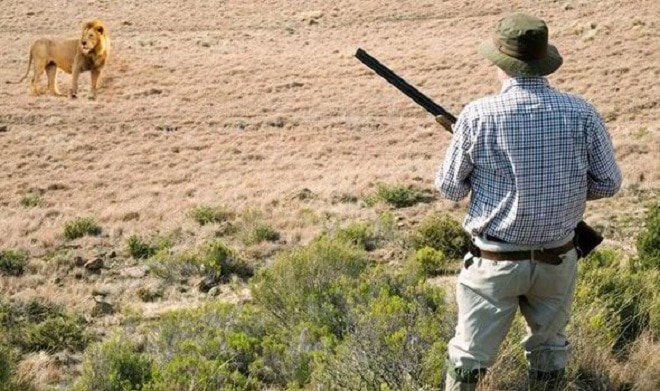
The U.S. Fish and Wildlife Service is using its regulatory authority to clamp down on lion trophies brought back into the states. (Photo: AFP)
The Obama administration’s Fish and Wildlife Service announced Monday that two lion subspecies would now be listed under the Endangered Species Act, largely prohibiting the import of their trophies.
The species, Panthera leo leo, located in India and western and central Africa, will be listed as endangered; while Panthera leo melanochaita, located in eastern and southern Africa, will be listed as threatened moving forward. The action will prevent USFW inspectors from allowing the importation of sporting-related trophies from these species.
The action comes after a summer of unprecedented public outcry over the taking of a celebrity lion in Africa by a U.S. hunter and is needed, contends the agency, to help stave off a decline in lion populations in the wild.
“The lion is one of the planet’s most beloved species and an irreplaceable part of our shared global heritage,” said USFW Director Dan Ashe in a statement. “If we want to ensure that healthy lion populations continue to roam the African savannas and forests of India, it’s up to all of us – not just the people of Africa and India – to take action.”
In 2011, the agency received a petition to list the whole Panthera leo subspecies of African and Indian lion as endangered and cites that just over 1,400 of these animals still exist, thus meeting the requirement for reclassification. While the Panthera leo melanochaita are more numerous, with as many as 19,000 scattered across the African continent, and the agency admits numbers are on the rise, it felt the designation as a threatened species would help with conservation efforts.
Trophies from the endangered lions will generally be prohibited while a strict permitting process will be set up for the more numerous threatened species. The agency contends it will deny applications for those who have been convicted of or pled guilty to violations of wildlife laws.
“Importing sport-hunted trophies and other wildlife or animal parts into the United States is a privilege, not a right; a privilege that violators of wildlife laws have demonstrated they do not deserve,” Ashe said. “We are going to strengthen our efforts to ensure those individuals – people who have acted illegally to deprive our children of their wildlife heritage – are not rewarded by receipt of wildlife permits in the future.”
On July 1, Cecil, a 13-year-old male Southwest African lion, part of a University of Oxford research program in and around the Hwange National Park in Zimbabwe was shot after Walter Palmer, a recreational big-game hunter and dentist from Minnesota, had originally wounded him with an arrow. Media attention, whipped up by anti-hunting groups and celebrities led to both an outpouring of donations to Oxford and a flood of hate mail and public vilification of Palmer.
As part of the rush to action, lawmakers in Washington proposed to expand protections for the animals under the Endangered Species Act while airlines rushed to pull the plug on safari hunters seeking to bring their trophies back stateside.
Palmer himself, the subject of an Internet shaming campaign, dropped out of the public eye for several weeks before reemerging to defend himself publicly, explaining the backlash had been hard not only on him but on his family and dental practice.
“They’ve been threatened. In the media, as well, and the social media, and … I don’t understand that level of humanity, to come after people not involved at all,” he said.
Zimbabwe’s Environment Minister Oppah Muchinguri, who at the height of the controversy called for Palmer’s extradition to that country to face possible charges, later advised the hunter would not be prosecuted.
“We approached the police and then the Prosecutor General, and it turned out that [Walter] Palmer came to Zimbabwe because all the papers were in order,” Muchinguru said.
Meanwhile, an adult male lion in the same refuge Cecil lived in, Hwange National Park, killed an armed and experienced guide in front of a tour group. The guide, Quinn Swales, 40, was killed when a lion he was tracking as part of a tour double backed on him and attacked him.
The final USFWS lion rule will publish in the Federal Register on Wednesday, and will go into effect 30 days after publication on Jan. 22, 2016.
The post Feds slam the door on lion trophy imports appeared first on Guns.com.
